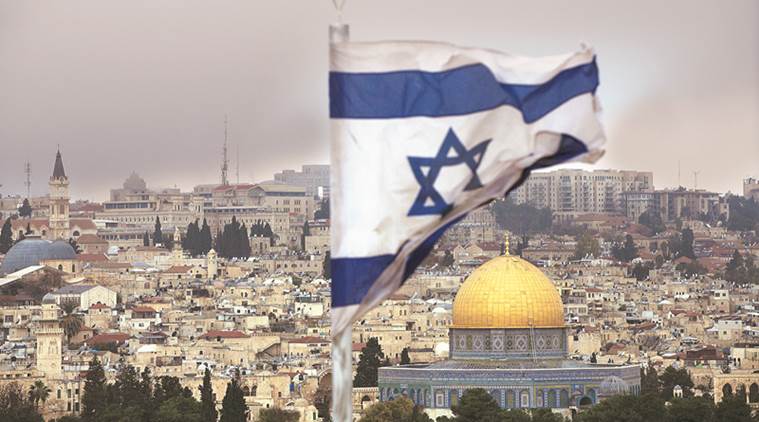IN THE MEDIA
Embassy move in Israel would just recognise reality
October 19, 2018 | Ahron Shapiro

PRIME Minister Scott Morrison has taken considerable heat for announcing on Tuesday that Australia was considering moving its embassy in Israel to Jerusalem.
Critics say this will damage peace prospects by angering the Palestinians and other Arabs and that recognising Jerusalem as Israel’s capital — which it has been since 1950 — must wait until a two-state peace deal also sees a Palestinian capital in eastern Jerusalem.
While Palestinian lobbyists certainly objected loudly to Morrison’s announcement, a recent story highlights how submitting to grandstanding protests by official Palestinian representatives doesn’t necessarily promote peace.
On October 7, in the Israeli town Rosh Haayin, Kim Levengrond Yehezkel, 28, dropped her 18-month-old son Kai at daycare on her way to work.
She didn’t return home that night, nor did her co-worker Ziv Hajbi, 35 — a father of three young children. They were allegedly gunned down in cold blood by a Palestinian terrorist who used his proximity to Jewish Israelis at his workplace to perpetrate his attack. A third victim, Sara Vaturi, 54, credited her survival to a Palestinian co-worker, Bassal, who stanched her bleeding and calmed her until help arrived.
The crime scene was a factory in the Barkan Industrial Park, a few kilometres inside the West Bank where 164 businesses employ some 4200 Palestinians and 3000 Israelis working side-by-side. In its 26 years, Barkan had never before been targeted by terrorists.
There are nineteen other Israeli industrial parks in the West Bank — most of them near the border with Israel or in settlement blocs Israel would be expected to retain through land swaps in any peace agreement. Altogether, about 30,000 West Bank Palestinians carry permits to work either in them or Israeli settlements. Some 70,000 more hold permits to work inside Israel proper. In recent years, just a handful of permit-holders have committed terror attacks.
The rarity of such attacks and the way other Palestinian workers at Barkan responded say much about the positive role economic co-operation between Israelis and Palestinians has in fostering relations on a grassroots level.
Both Israeli and Palestinian workers at Barkan interviewed after the attack praised the industrial park as a model of coexistence, where friendships based on mutual respect are forged through economic co-operation.
The 18 percent unemployment rate in the West Bank would be considerably higher should Israeli-Palestinian industrial zones like Barkan disappear. Additionally, jobs in Israeli industrial zones not only pay Palestinians much higher salaries than comparable jobs in the Palestinian Authority (PA), but the Palestinians are protected under the same labour regulations and conditions as Israelis.
Thus, international campaigns to boycott Israeli businesses in the West Bank — backed by the Palestinian leadership and its most dedicated supporters — actually harm both Palestinians and prospects for peace. They ignore the welfare of the tens of thousands of Palestinians who depend on those businesses for their livelihoods.

Relatives and friends mourn during the funeral of Kim Levengrond Yehezkel, who was killed in an attack by a Palestinian terrorist on October 7. Picture: Gil Cohen-Magen/AFP
Critics accuse Israel of allegedly violating the Fourth Geneva Convention vis-a-vis the Palestinians, yet conveniently forget that the Convention views job creation efforts in “occupied” areas as absolutely desirable, provided the workers receive the same workplace conditions and terms as “the nationals of the Power in whose territory they are” — as authorised Palestinian workers certainly do.
Boycott activists insist Israel’s West Bank industries must be strangled for peace, yet in reality, economic co-operation between Israelis and Palestinians, including in industrial parks like Barkan, is both legal and embodies the spirit of coexistence that is essential to achieving the goal of two states for two peoples.
Similarly, recognising the reality that Israel has had its capital in west Jerusalem since 1950, as the US, Russia, and several other countries have done, in no way precludes a future Palestinian capital in the city’s eastern half. Palestinian leadership objections are based on a zero-sum model which say any diplomatic gains for Israel are a loss for them, so they argue any change will destroy peace hopes.
Yet after decades of the world caving in to Palestinian recalcitrance, we are no closer to peace than before. In fact, for the past few years, the Palestinian Authority has been refusing to even negotiate, preferring to instead seek the delegitimisation of Israel in international forums. A circuit-breaker, such as the Trump Administration’s changes on Jerusalem and other issues, is badly needed.
On both Jerusalem and the economic zones of the West Bank, it makes sense for Australia to look at what really promotes peace. Loud Palestinian protests which fly in the face of the evidence on the ground should not factor into our calculations.
Ahron Shapiro is a senior policy analyst at the Australia/Israel & Jewish Affairs Council.
Tags: Australia, Israel, Palestinians





